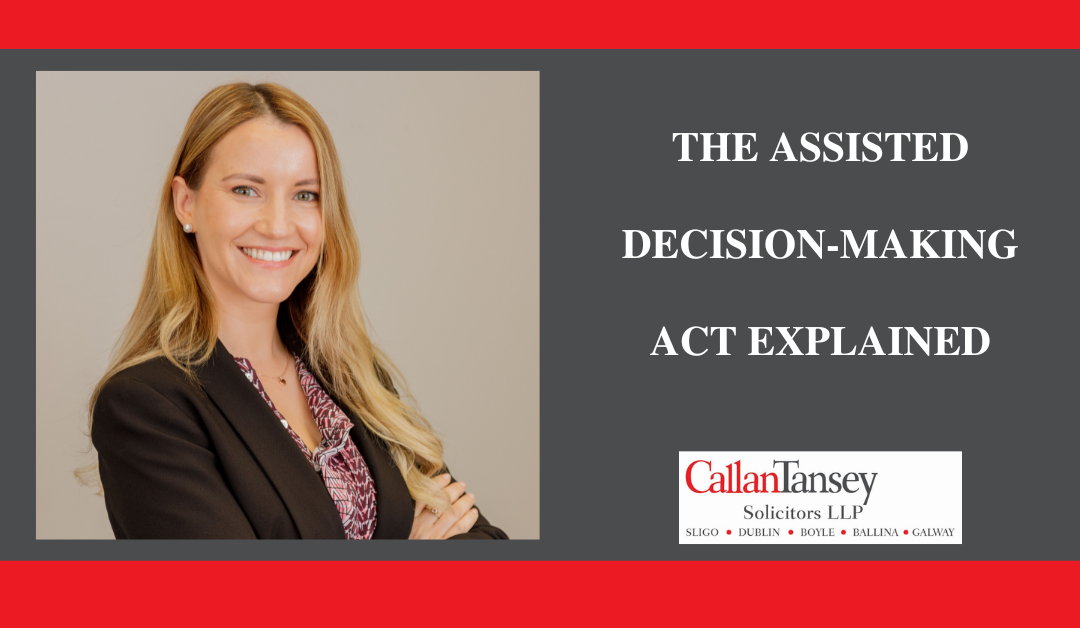The Assisted Decision-Making (Capacity) Act was signed into law on 30 December 2015. However, a number of amendments to the Act were required and provided for in the Assisted Decision-Making (Capacity) (Amendment) Act which was signed into law on 17 December 2022 paving the way for Assisted Decision-Making in Ireland. Treasa Norrby, from our Ballina office, outlines the key elements of the new legislation.
The enactment of the Assisted Decision-Making (Capacity) Act 2015 has implemented a new legal process to assist a person in their decision-making. It is designed to support people as much as possible to make their own decisions and any action should be the least restrictive on a person’s rights and freedoms. It has abolished the previous Wards of Court system, made changes to the Enduring Power of Attorney, and introduced Healthcare Directives between an individual and their healthcare practitioner.
There will be a phased system of review for every adult within the Ward of Court system over the course of the next three years starting from the 26th of April 2023. Following the review, a declaration will be made as to whether a person has the capacity to make decisions, with or without the assistance of a co-decision maker. This review will occur automatically. A solicitor may also make an application for the review to occur sooner. The Act only applies to adults. All current Wards of Court under the age of eighteen will remain under the existing system.
Moving forward the Circuit Court will now have exclusive jurisdiction in capacity matters except for certain matters to be reserved for the High Court.
What is meant by the term Relevant Person?
A person who lacks capacity will no longer be referred to as a “person of unsound mind” or a “Ward of Court” and any person engaging with the decision-making supports under the Act will be referred to as a “relevant person”.
Decision-Making Arrangements
There are now five formal decision-making arrangements available. These arrangements allow for advance planning and for situations where a person’s capacity is in question or will shortly be in question.
Advance Planning
- Advance Healthcare Directive: This sets out an individual’s wishes in relation to healthcare treatment decisions to allow for a situation where they are unable to make these decisions for themselves in the future.
- Enduring Power of Attorney: This arrangement allows an individual to plan ahead for a situation where they are unable to make certain decisions for themselves. It sets out the types of decisions they may need someone to make and appoint someone they know and trust to make those decisions on their behalf.
Where Capacity is in Question/Soon to be in Question
- Decision-Making Assistance Agreement: If a relevant person believes they may have difficulty making certain decisions, they can make a decision-making assistance agreement and choose a person they know and trust to be their decision-making assistant. The decision-making assistant does not make decisions for them, they help them to make their own decisions by gathering the relevant information, explaining it to them, and help them weigh up their options.
- Co-Decision-Making Agreement: This agreement allows a relevant person to choose someone they know and trust to make certain decisions with These decisions must be made together, and a relevant person can choose what decisions they need help with.
Where a person lacks capacity
- Decision-Making Representative Order:This is the most extensive form of intervention under the new Act. The appointment of a decision-making representative is similar to the former role of a committee under the Ward of Court system. A decision-making representative’s role is to make certain decisions on the relevant person’s behalf. This may include decisions about property and finances, as well as decisions about personal welfare. A decision-making representative is someone who will be appointed by the Court as opposed to being appointed by a relevant person.
Decision-Making Assistant Agreements and Co-Decision Making Agreements must be registered with the Decision Support Service. An application must be made to the Circuit Court for a Decision-Making Representative Order.
Who can make an Application for a Decision-Making Representative Order?
Any person can make an application to the court in relation to a relevant person’s capacity to make certain decisions if they can show that they have a true interest in the welfare of the relevant person. The court decides whether an individual is suitable for the role. Certain individuals do not need the court’s consent which includes the relevant person themselves, the relevant persons spouse, civil partner or cohabitant, or the relevant person’s adult child.
What are the requirements to make an Application?
In order to make a capacity application, you need to complete the necessary paperwork and submit it to the court office. This can be done with the assistance of a solicitor. One of the most important documents will be a Capacity Report/Capacity Assessment.
Functional Capacity Assessment
All applications will rely on the report of a medical practitioner or healthcare practitioner on the capacity of the relevant person. The capacity assessment used is called a “Functional Test” for capacity. This essentially means that the assessment is about a specific decision that needs to be made at a specific time. The capacity assessment will consider whether the relevant person
- understands the information relevant to a decision,
- can retain that information long enough to make a decision and
- can use or weigh that information as part of the process of the decision-making process, and to communicate his or her decision.
The Assisted Decision-Making (Capacity) Act has only recently been enacted and consequently, it is practically still in a state of flux. There will be the inevitable teething problems therefore it is essential that any relevant person or their committee, seek legal advice as to the implications of the new legislation on their current wardship and the associated ramifications.


